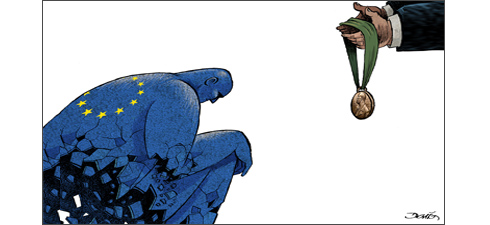At the hour of the greatest crisis in its history the European Union has been awarded the Nobel Peace Prize. Among its reasons, the Nobel Committee congratulates the Union for having "helped transform Europe from a continent at war to a continent at peace."
Certainly, it would be difficult to imagine other reasons for giving out a Nobel Peace Prize. However, it’s the circumstances of the current crisis that shed light on the significance of giving this Nobel to the European Union, or more precisely the repercussions such a decision may have on the current state of the Union.
I interpret the decision to award the Nobel Peace Prize to the EU at the moment when the Union has never been weaker as a petition directed at the European political elites – those same elites who, as we all see, are conducting themselves in the crisis today with neither courage nor vision.
The Nobel Peace Prize makes it clear to the governments that are presently steering the eurozone countries that they must step out from their own shadow and so move the European project forward. It is written in the text of the appeal in black and white, and at least three times.
A call for solidarity among its citizens
The Nobel Committee begins by praising the reconciliation and the building of peace in Europe after the Second World War. The text then discusses the efforts to build and promote democracy and freedom, as well as the liberalisations that the European Union promoted in the 1980s for Greece, Spain and Portugal, as it did in 1989-1990 for the countries of central and eastern Europe, which would join the Union later – efforts that Europe must now push ahead with in the Balkans.
The Nobel Committee salutes the courage that Europe was able to summon up to overcome historical hostilities and succeed in the civilising mission that is the enlargement of the European Union, which will one day extend to Turkey. But that’s not all. One had to wait to read the third reason of the Committee to discover the irony governing the bestowal of the Nobel Peace on the European Union.
The Nobel Committee refers to the economic crisis that is behind the "unrest and considerable social tensions" in the countries of the eurozone and that is pushing a Europe plagued by a weakness of leadership towards the edge of a rupture. What is at stake, if we read the text well, is the third major achievement of the Union: that is, its social model, grounded in the welfare state.
At the moment, we Europeans persist in remaining quietly and calmly on the threshold of a two-speed EU. That is why I also see the decision to award the Nobel Peace Prize to the European Union as a call for solidarity among its citizens, who must say what kind of Europe they want. Only by deepening the institutions of "Kerneuropa" – core Europe – will we tame the capitalism that has grown wild and stop the process of the internal destruction of the Union.
Do you like our work?
Help multilingual European journalism to thrive, without ads or paywalls. Your one-off or regular support will keep our newsroom independent. Thank you!












